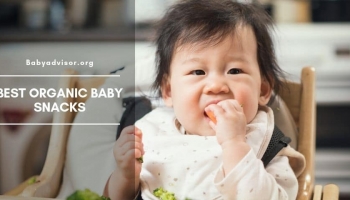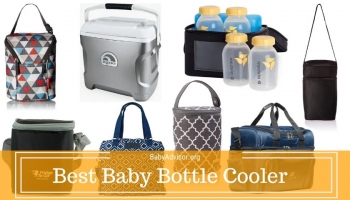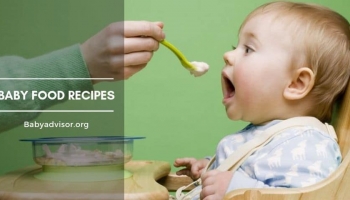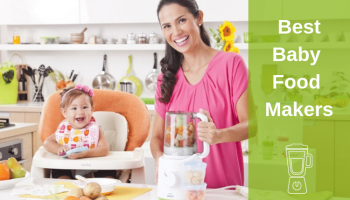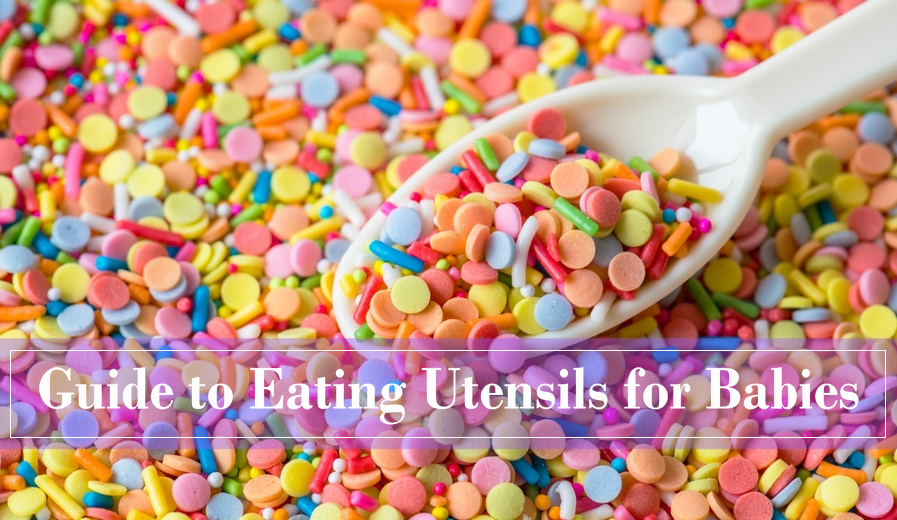
Now that your baby is old enough to eat solid foods, you have to pick up a few of the best baby utensils. Most babies are ready for solid foods around six months of age, which is the recommended age by the American Academy of Pediatrics.
Obviously, you need food to feed your baby, but other tools are necessary too. Bowls, plates, spoon, and forks are a few necessary accessories to make meals easier. You get a lot of use out of these tools because your baby has to eat three meals a day plus a few snacks. Any money you spend is well-invested in these tools.
| Brand | Spoon, Fork, or Both? | Material Used | Price |
|---|---|---|---|
| The First Years Take & Toss Flatware | Both | Plastic | $ |
| ChooMee FlexiDip Starter Spoon | Spoon | BPA-Free Silicone | $ |
| Beaba First Stage Baby Feeding Spoon Set | Spoon | Silicone | $$$ |
| Lullababy Fork and Spoon Set | Both | BPA-Free Silicone | $$ |
| Miniware Teething Spoon Cutlery Se | Spoons | Silicone | $$ |
| Olababy Silicone Spoon Teether | Spoon | Silicone | $$ |
| Re-Play Spoon and Fork Set | Both | Food-Grade Recycled Plastic | $ |
| Bambusi Bamboo Weaning Spoons | Spoons | Bamboo Handle & Silicone Spoon | $$$ |
| Boon Swap Baby Utensils | Spoons | Metal & Silicone | $$ |
| Munchkin 6-Piece Fork and Spoon Set | Both | Plastic | $ |
What Baby Feeding Tools Do Babies Need?
We know that feeding time can be fun, yet stressful, for parents, especially once your baby reaches the age of chucking all of his food onto the floor. Unbreakable items are a must-have for babies. Don’t even think about giving that angel your Fiesta Ware bowl. It’ll be on the ground, in pieces, for sure. Ask us how we know!
There are a few tools that we recommended for baby feeding time.
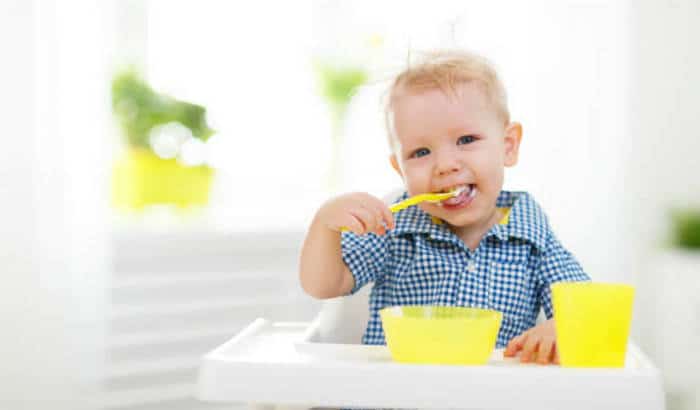
- Bowls & Plates – Check Our top picks.
- Forks
- Spoon
- High Chair
- Bibs
Are Baby Spoons and Forks Necessary?
Some parents like to save money and only purchase items for babies that are necessary, so you might wonder if baby spoons and forks are REALLY needed? Can’t you just use the spoons you have in your drawer? After all, if it’s good enough for you, why isn’t it okay for a baby?
You COULD use a regular spoon or fork, but most pediatricians recommend using a shallow, plastic children’s spoon for feeding. It’s much easier for them to eat from and it won’t hurt their delicate mouths. Babies and toddlers with more teeth could use a metal one without much harm.
The Different Kinds of Baby Spoons and Forks
There are different utensils for different feeding styles – parent and self-feeding. Parent feeding is just what you might assume. That’s when YOU feed your baby! Self-feeding is when the baby is in control over his food, whether he is an older baby or young toddler OR parents who use baby-led weaning.
For Parenting Feeding
- Silicone Spoons: These spoons are made of soft, silicone that you can just toss into the dishwasher. Silicone is easy and safe for babies to chew, so it is a great way for them to learn how to eat. Make sure you guarantee they are BPA-free.
- Bamboo Handled Spoons: Some parents love these spoons! They’re biodegradable and adorable! The plastic or metal spoon part can be washed separately because they are removable.
For Self-Feeding
- Combined Spoon and Teether: These spoons are made larger with a chewy texture. That lets your baby chew and chomp on them comfortably. The teething part encourages kids to learn how to use a spoon.
- Ergonomic Spoons: It can be hard for little hands to learn how to hold a spoon correctly. Ergonomic spoons are chunkier and are shaped easier for babies to learn how to handle. It helps develop their fine motor skills.
How to Pick the Best Baby Utensils
Here are the factors to consider when picking the best baby utensils.
Material Used to Make It
The most important feature to consider is what the spoon or fork is made of. Babies aren’t coordinated enough to use metal forks and spoons. They could hurt themselves by biting down on the metal with their gums. Softer materials are a good idea. Plastic, rubber, and even wood is good for babies.
Who Will Feed Baby?
Look at the different types of utensils above. Are you feeding your baby or is he feeding himself? The style of handle matters when your child starts to independently feed. You want one that is comfortable for him to hold and handle on his own.
Choking Hazards
Some spoons and forks have removable ends because the handle may no be dishwasher safe. If you want that style of utensil, make sure you keep a close eye on your baby. You don’t want that end coming off and becoming a choking hazard.
Size
Baby utensils SHOULD be smaller than yours. It might look small to you, but it’s probably the right size for your infant. It should be able to fit into your baby’s mouth
Cost
Many baby utensils are cheap, so you don’t have to sell an organ to afford a few sets. That doesn’t mean you need to rush out and buy the cheapest set. Some don’t last long. They end up breaking or full of teeth marks before long. Those super-cheap ones may contain harmful chemicals as well.
Our Baby Utensils Review: Get Best Spoon & Fork Now!
1The First Years Take & Toss Flatware
The First Years Take & Toss Flatware
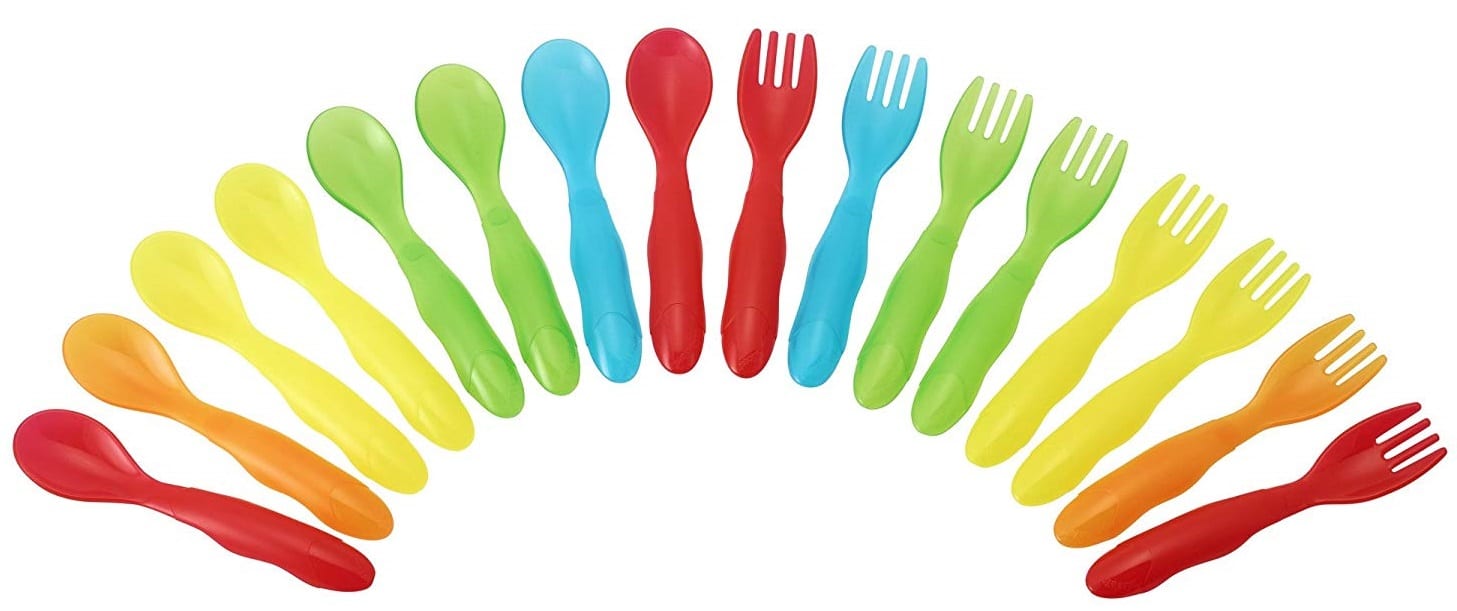
The set comes with 8 forks and 8 spoons, which is enough to keep some at home, in the diaper bag, and at grandma’s house. You won’t feel so bad when you leave one at a restaurant because they’re so inexpensive!
These utensils are far from fancy, but they do the job. They have textured handles with finger grooves to help your toddler, plus they’re dishwasher and microwave safe. All First Years products are BPA free!
Check Pricing and Availability
- Dishwasher Safe
- Inexpensive
- 16 Pieces of Flatware
- Deep Spoons Make it Hard to Get Out
- Short Handle
2ChooMee FlexiDip Starter Spoon
ChooMee FlexiDip Starter Spoon
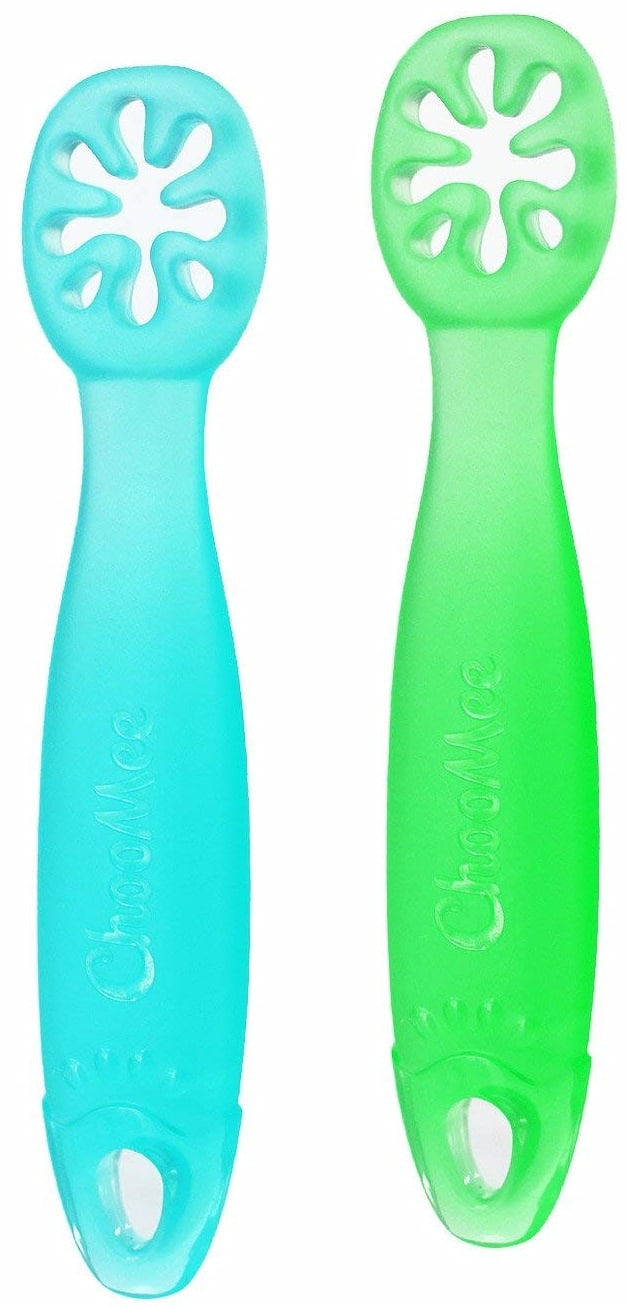
The set comes with two spoons, and each spoon is made out of BPA-free silicone. Silicone feels soft in your baby’s hand. The most noticeable difference is that they have a cutout in the scoop part, which means that the spoon isn’t solid there.
It seems counterintuitive but the purpose is that it helps your baby since they aren’t able to scoop up baby food at first. Some food will get trapped in the hole as your child dips it into his food. Babies get so frustrated when they try to scoop and it doesn’t work, so this design is fantastic.
If your baby is practicing his self-feeding skills, the ChooMee is the perfect transition rather than a frustrating, painful one. It lets your baby experiment and learn without frustration. The design promotes independence and confidence.
Silicone is hygienic, dishwasher and microwave safe, BPA, PVC, lead, and phthalate free. These spoons meet and exceed all US and European testing standards.
Check Pricing and Availability
- Comfortable grip
- Reduces spills and frustrations
- Helps baby master self-feeding
- Expensive
- Doesn’t work for runny foods, only purees
3Beaba First Stage Baby Feeding Spoon Set
Beaba First Stage Baby Feeding Spoon Set
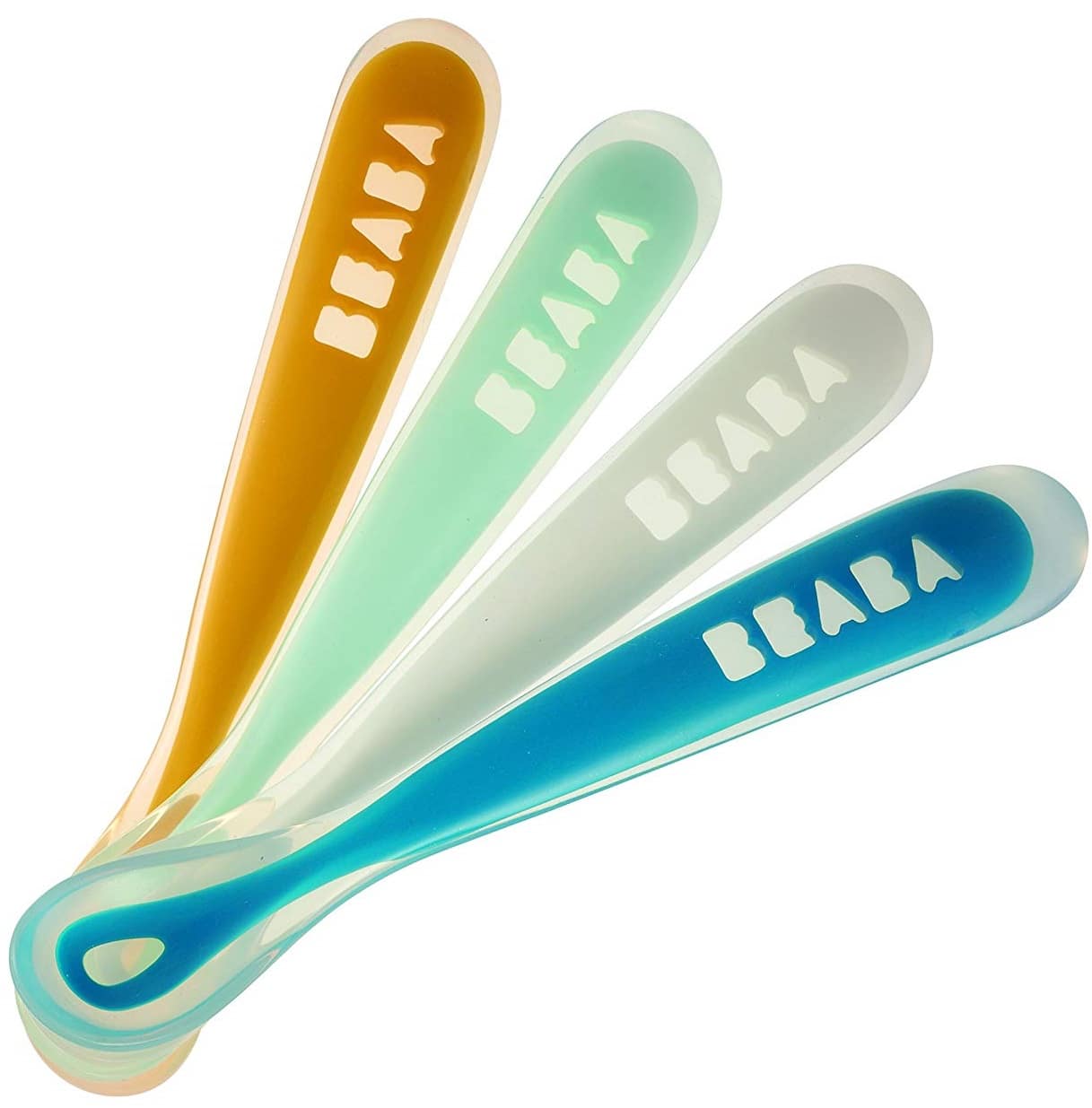
Beaba uses ultra-soft silicone, which is the perfect material for new feeders. Silicone protects your baby’s gums and teeth. You don’t have to worry about any rough edges harming your baby. The ergonomic handle makes it easy for parents to feed baby from any angle, and it’s the perfect length to scrape the bottom of the jar. No one wants to get baby food all over their hands!
As for the spoon itself, babies love it. It’s the right depth that helps baby transfer food without scooping off too much food at one time. You can trust Beaba and their products, which are always BPA, lead, and phthalate free. Plus, they’re dishwasher friendly!
Check Pricing and Availability
- Great for teething babies
- Easy to grip and doesn’t slide out of hands
- Durable
- Won’t tip over a bowl
- Spoons might stain.
- Hard for baby to use for self-feeding
4Lullababy Fork and Spoon Set
Lullababy Fork and Spoon Set
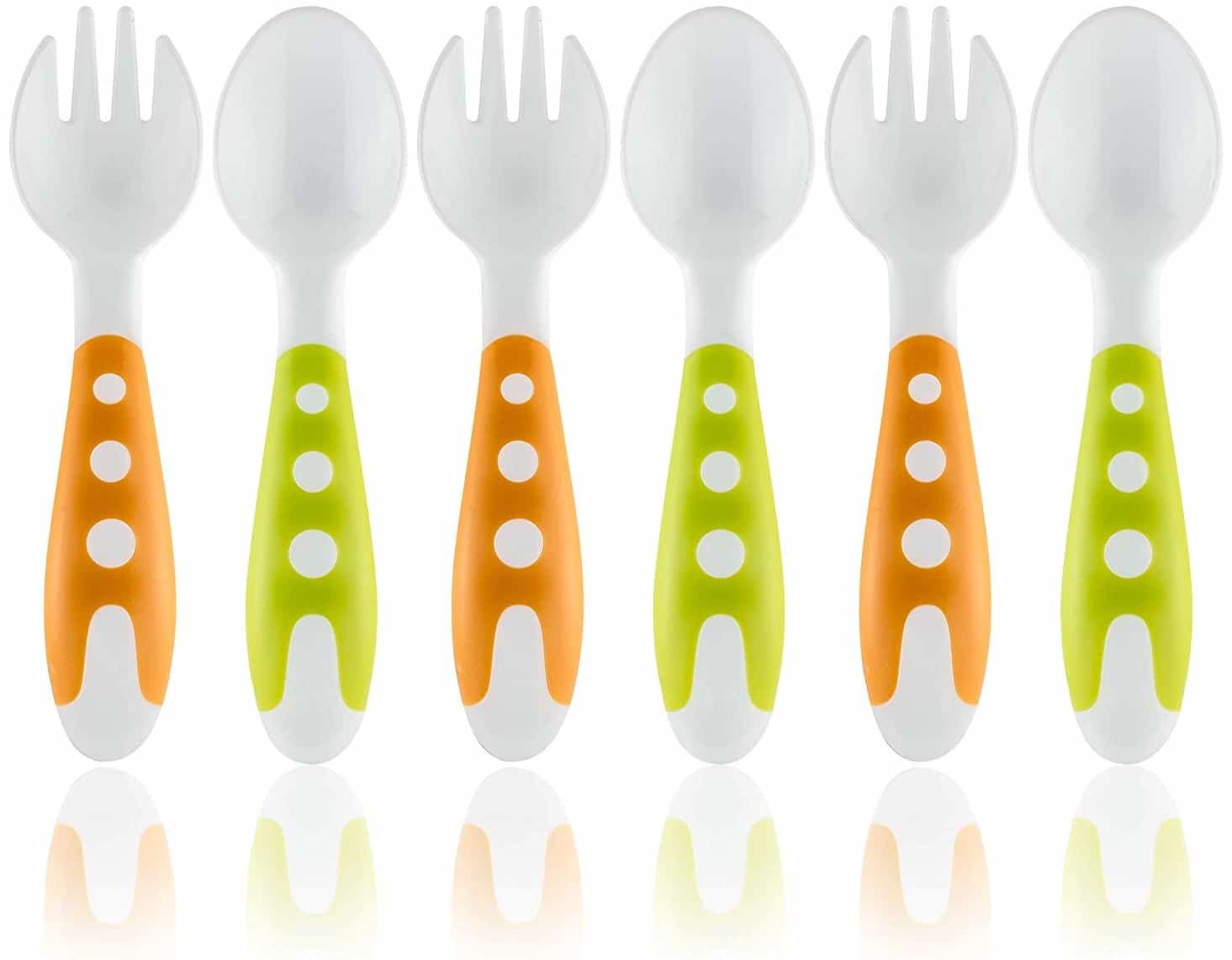
The utensils hold plenty of food, and the forks are shaped just like a spork. So, your baby will be able to get food with the safety of a spoon. The round edges of the fork are soft, so you don’t have to worry about your baby stabbing his mouth on accident.
Lullababy added non-slip material on the handles and thick, making it easier for your baby to hold them. The design prevents them from sliding out of your child’s hands as they eat. Lullababy is made of food-grade safe materials, and they’re all BPA-free!
Check Pricing and Availability
- Colorful appearance
- Great for traveling or at home use
- A safe option for a fork
- Pricey
- Doesn’t pick up food as easily as traditional forks
5Miniware Teething Spoon Cutlery Set
Miniware Teething Spoon Cutlery Set
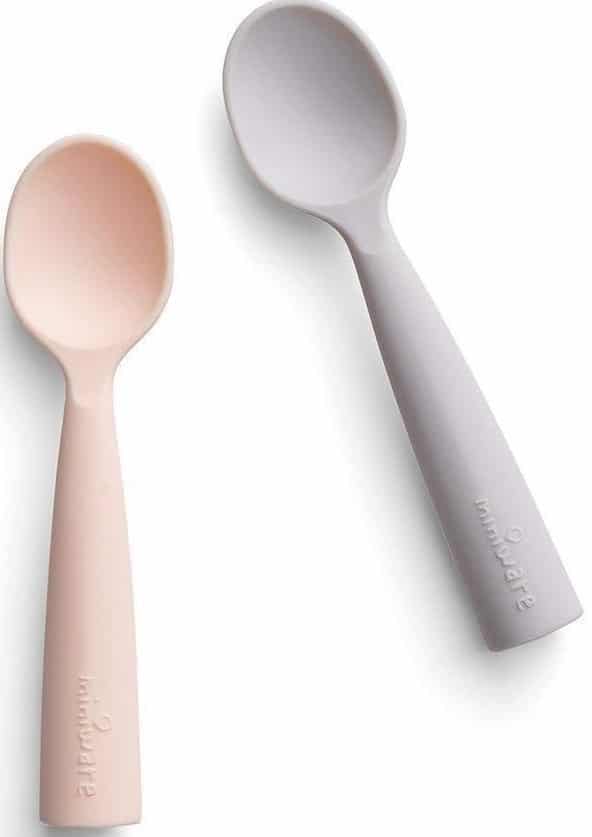
Each set includes two silicone spoons in different colors along with an clean carrying pouch. Babies love the rounded handles that make it easy for them to grip as they learn how to feed. Each spoon is the ideal weight, so balancing and controlling the spoon is easier. Learning how to guide a spoon is hard enough without a heavy spoon!
Parents like the notch on the bottom of the spoon that lets you hang it on the side of the bowl. No more spoons sliding into a bowl of applesauce – yay! Miniware utensils are always dishwasher safe.
Check Pricing and Availability
- Modern design
- Great for self-feeding babies
- Perfect size for babies to hold
- Soft silicone won’t hurt baby.
- Spoon is too deep.
- Too big for some baby’s mouths
6Olababy Silicone Spoon Teether
Olababy Silicone Spoon Teether
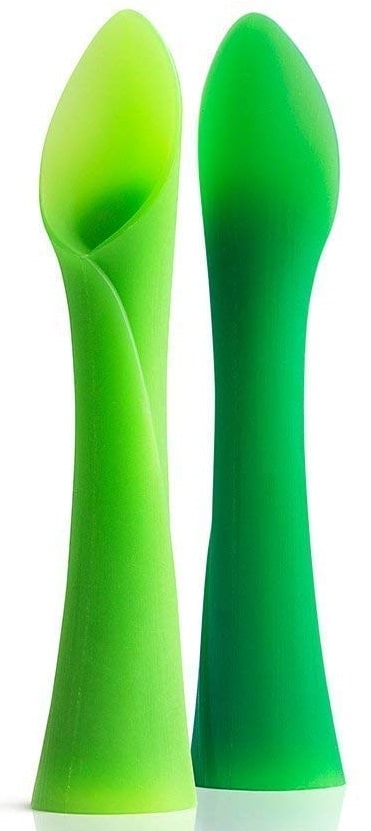
Olababy uses food-grade silicone, so you can toss them in the dishwasher once your baby is done eating dinner. While the design might look strange, these spoons are perfect for infants and toddlers who are learning how to self-feed. The soft material makes a great teether, and the flexible tip won’t hurt your child’s mouth.
It’s a great starter spoon for your baby. Whether your child is spoon feeding, self-feeding, or baby-led weaning, he can benefit from the Olababy spoon! Best of all, this spoon is toxin free, BPA, latex, and phthalate free!
Check Pricing and Availability
- Small, easy for babies to hold
- Doesn’t stain
- Dishwasher safe
- Perfect teething material
- Strange odor at first
- Expensive
7Re-Play Spoon and Fork Set
Re-Play Spoon and Fork Set
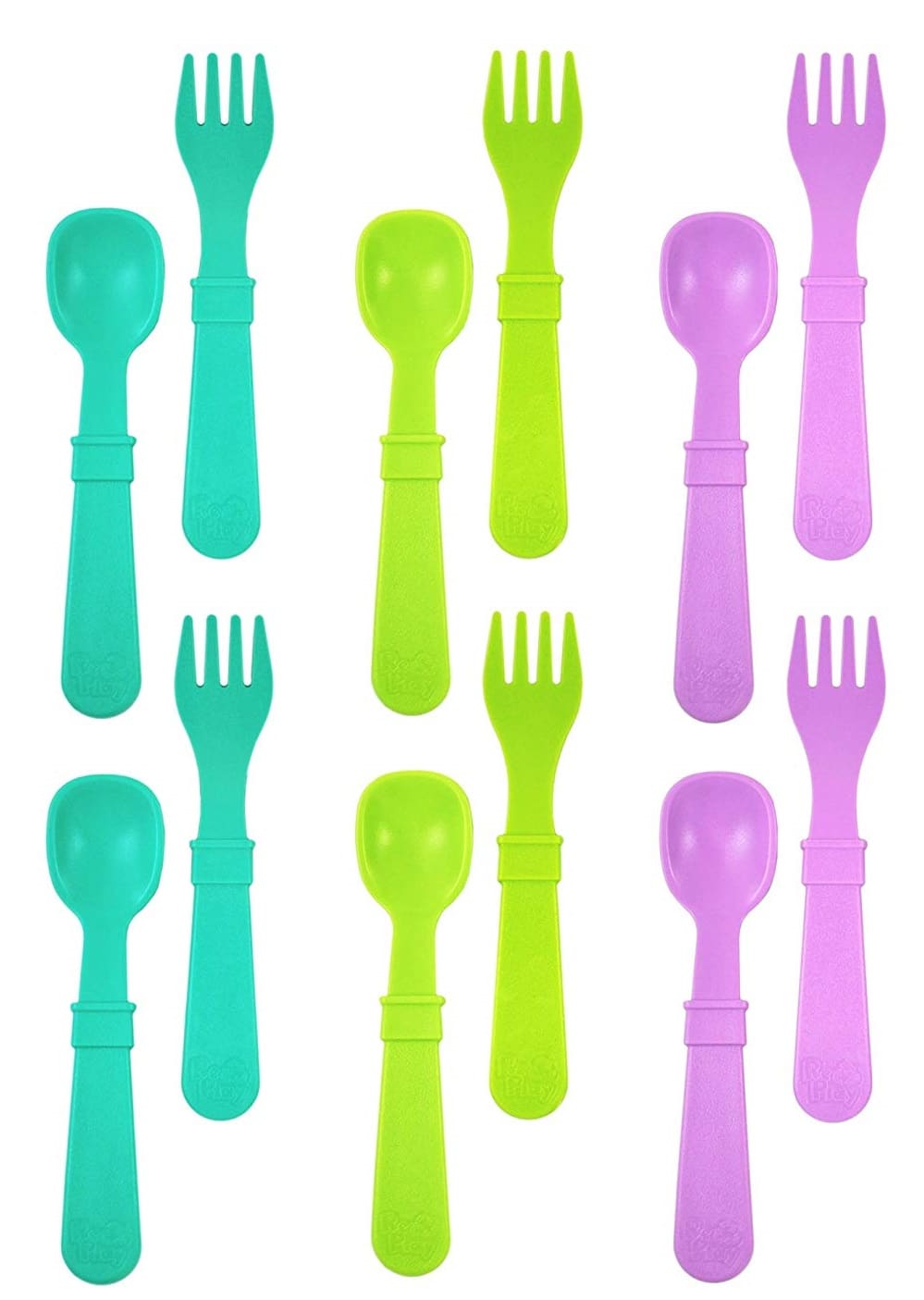
The Re-Play spoons have deep scoops, great for older infants who are learning how to self-feed. The forks have durable, rounded tips that won’t hurt your baby. We love the thick, pudgy handles that are easy to grip and learn how to use.
As soon as you hold one of these utensils, you’ll notice how durable they feel. Re-Play designed them to last from one child to the next. They had a goal to make self-feeding easier, and their products are loved by babies and parents alike!
Each set includes six spoons and six forks, plus they’re budget-friendly. Re-Play items are dishwasher and microwave safe. Their items are free from BPA, BPS, PV< lead, phthalates, and melamine. In addition, all Re-Play products surpass FDA and EU purity standards.
Check Pricing and Availability
- Made in the USA
- Great for little hands
- Forks aren’t flimsy
- Lasts for a long time
- Affordable
- May be too wide for baby’s mouth
- Made of plastic
- Not a good choice for baby to chew on
8Bambusi Bamboo Weaning Spoons
Bambusi Bamboo Weaning Spoons
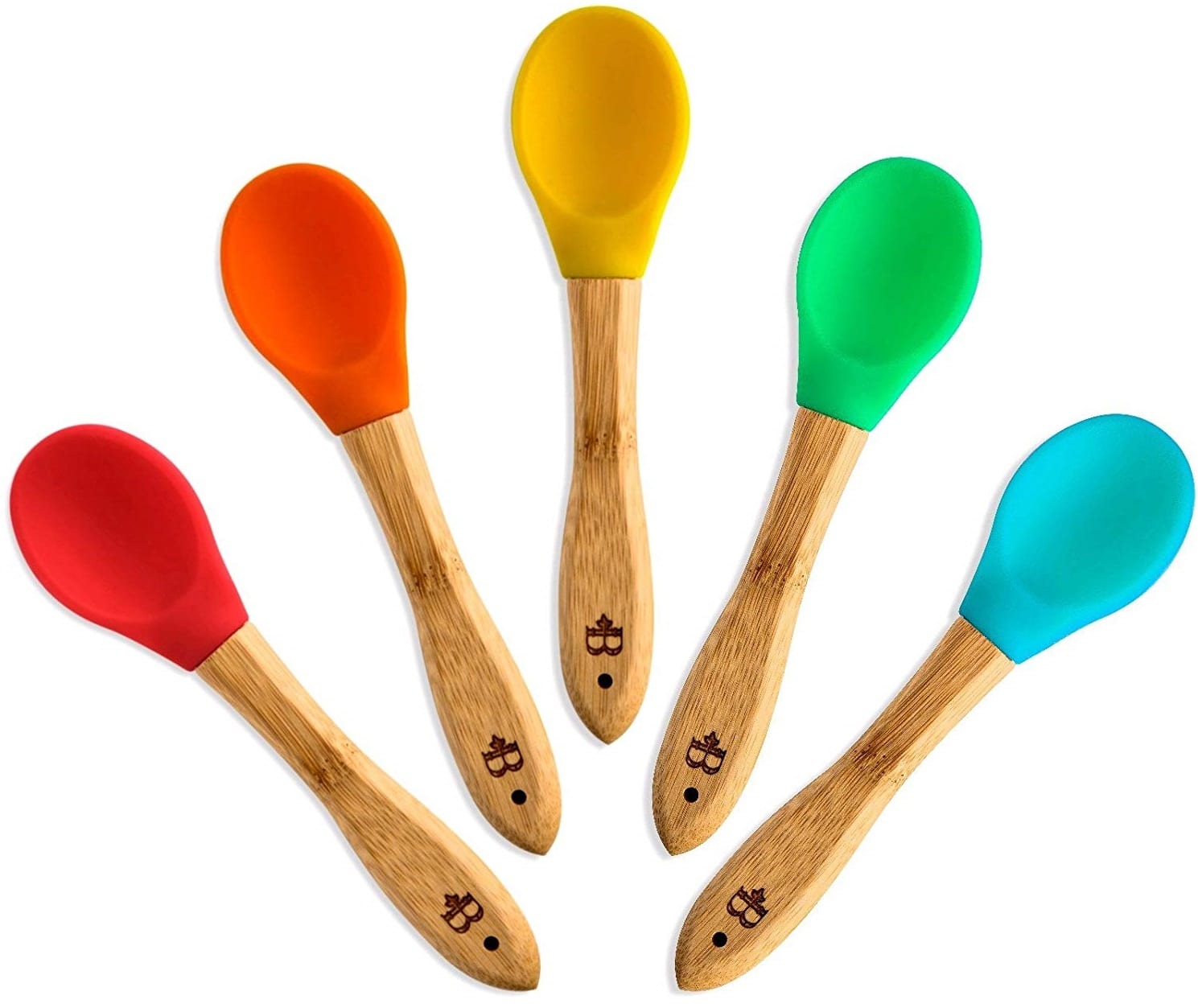
Bambusi uses germ resistant, organic bamboo along with food-grade silicone tips for the perfect combination of materials. The spoon will feel soft and flexible in your child’s mouth. These spoons are lightweight and easy to tuck into your diaper bag whenever you need to leave the house. The lightweight design also makes it easier for babies to hold by themselves.
The combination of silicone and Moso bamboo makes the spoons totally BPA free. Bambusi products are also plastic, phthalate, and lead free, perfect for little babies! One unique feature is that the silicone portion of the spoon is detachable so you can place that in the dishwasher. The handle needs to be hand washed.
Check Pricing and Availability
- Toxin free
- Lightweight for baby to use
- Perfect for first-time eaters
- Bright colors are fun!
- Handle isn’t dishwasher friendly.
- Detachable head could be a choking hazard.
9Boon Swap Baby Utensils
Boon Swap Baby Utensils
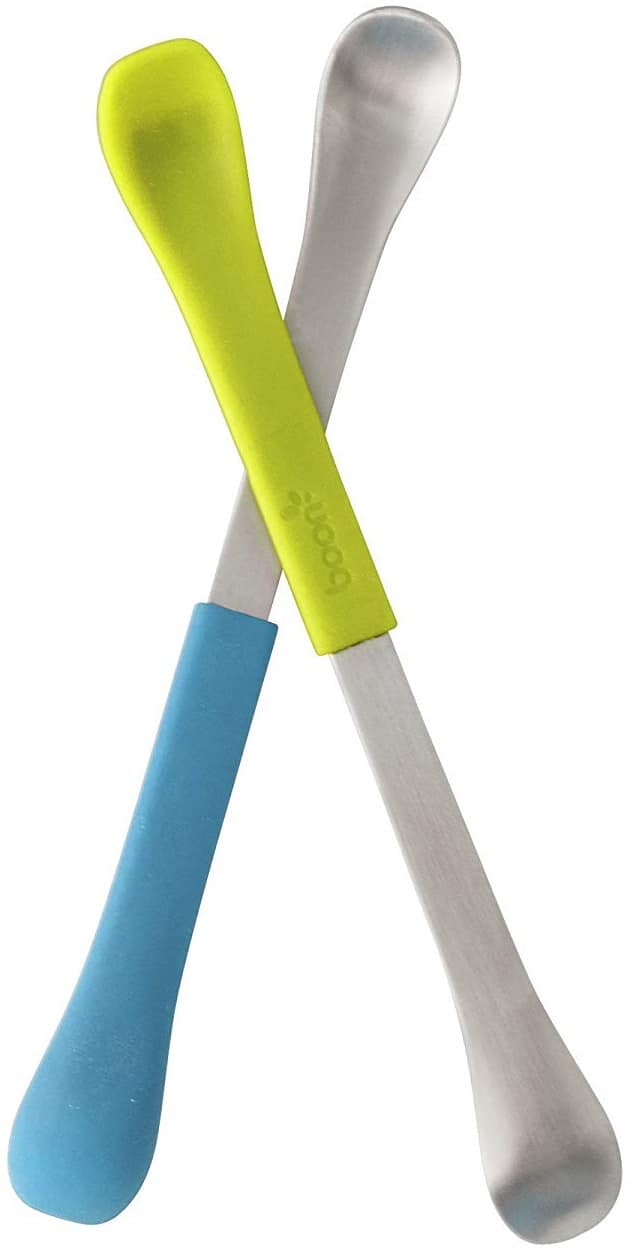
One of the unique features of the Boon Swap spoons is that they’re a 2-in-1. You can flip it over to pick between the plastic or metal ends, depending on what your needs are at the time. It gives you a chance to see what your baby prefers. Some babies do like metal spoons!
Boon created these with a smaller sized scoop, which makes it easier for your babies to transfer the food from the spoon to their mouths and down their throat.
Check Pricing and Availability
- Metal and plastic sides
- Dishwasher safe
- Non-toxic
- Angled sides so you can scrape sides of bowls
- Plastic stains
- Spoon angle might be too steep
10Munchkin 6-Piece Fork and Spoon Set
Munchkin 6-Piece Fork and Spoon Set
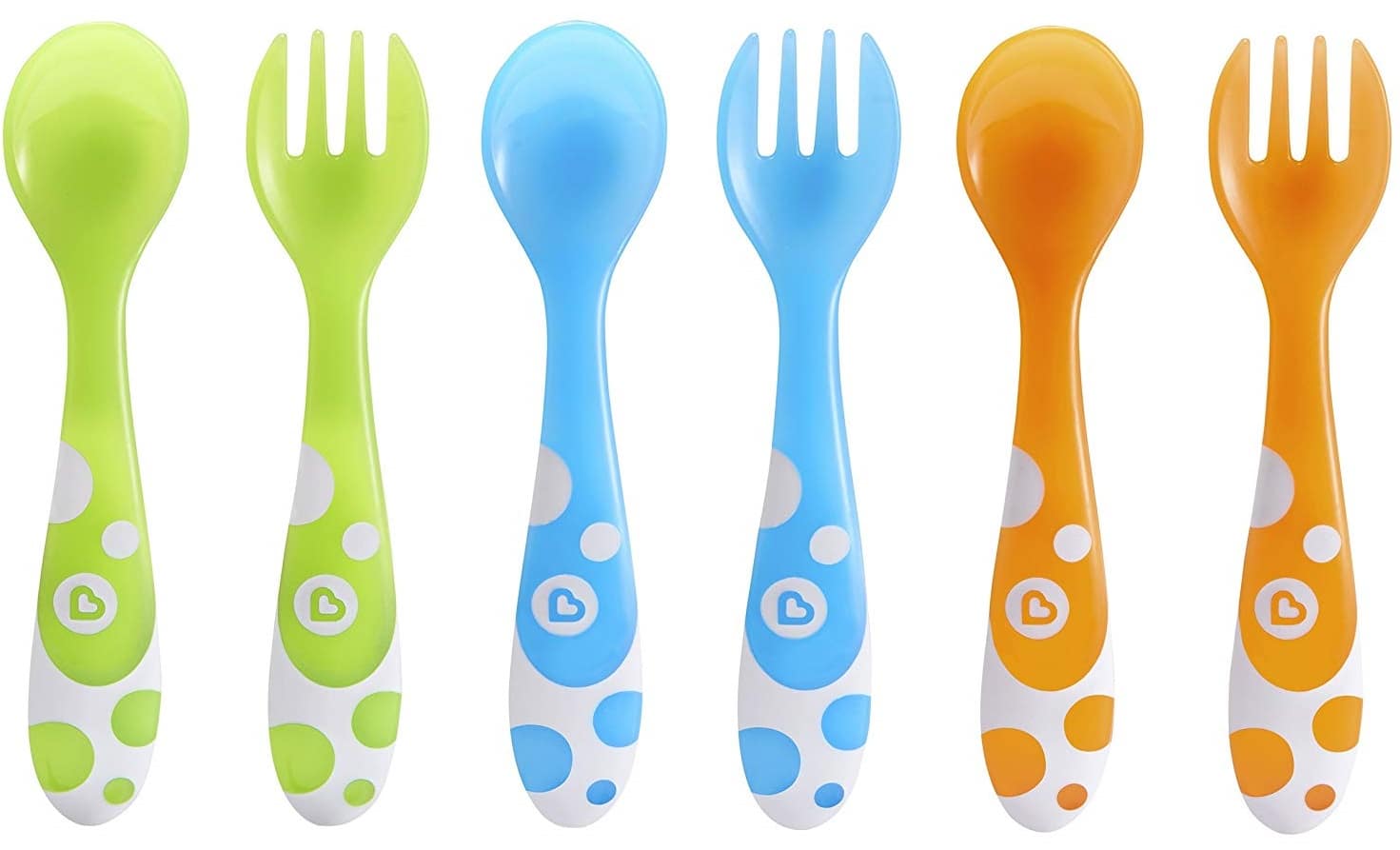
Munchkin used polypropylene plastic to create these utensils. Each one is BPA-free, and they’re awesome for self-feeding and parenting feeding. The spoons are deep to hold more food and to make scooping easy. The curved fork is safe and rounded, so your baby won’t stab himself. However, the design is meant to encourage the transition to using cutlery.
These forks and spoons are top rack dishwasher safe, perfect for babies who are 12 months and older!
Check Pricing and Availability
- Handles have grip for easy holding
- Affordable
- Great for self-feeding toddler
- Perfect depth for scooping food
- Made with plastic
- Stains easily
- For babies who are 12+ months
When Can I Introduce a Baby Spoon?
Pediatricians recommend that parents introduce solid foods around six months old, but some say you can as early as four months old. Your baby is used to eating by pushing their tongues out to latch onto the breast, but they have to learn how to move their tongues inward to eat from a spoon.
Here are the signs that your child is ready to eat solid foods from a spoon.
- They’re interested in what adults are eating around them.
- Baby starts to drools more often.
- He puts toys or teethers into his mouth.
- He is at least four months or older, ideally six months old.
- Baby can hold his neck upright without any support.
When Will My Baby Use a Spoon By Himself?
Using a spoon may seem like the easiest feat for you. You don’t even have to think about it anymore! For babies and toddlers, it requires a lot of motor skills.
Self-feeding is a huge milestone for children. It isn’t a task that they suddenly learn overnight. You will mark improvements over time. The first dozen (or hundred) attempts will be messy – so make sure you have bibs on stock!
After a year old, you will notice your child starts to have more success, but it’ll be slow. Let your child use it when they’re ready. It’s not a skill that you can force to develop faster. Some may need your help longer. Some babies master self-feeding rather quickly.
No matter what, your child should learn to use utensils around 18 months old, but it may be sloppy for awhile. By the time that your child is 3 or 4 years old, he should have utensil skills and table manners fully mastered.
When Can I Introduce a Baby Fork?
Most older infants and toddlers can be introduced to a fork once they start trying to use a spoon independently. Show him the poking action of the fork and hand it back to your child for him to try. It will take time for him to master it! Sometimes, he might get irritated with the process.
Make sure you let him practice with easy foods that won’t flop off his fork. A few options are:
- Cooked potatoes
- Green beans
- Pasta shells
- Melon chunks
- Toast square
- Soft fruit
- Chunks of canned fruit
Most babies prefer to use their fingers, which is absolutely fine and developmentally normal. Some cultures eat with their fingers more often than not, even for adults! Around 15 to 18 months, your toddler will show more interested in the fork. You can expect him to have a decent grasp of the motion of a fork around 2 years old. Complete mastery comes around 3 years old. Some foods are just harder than others!
Final Word – The Best Baby Utensils
Baby utensils are usable for years to come, and the right ones can be passed down through multiple children. It’s a good idea to invest in nice ones for home and some cheaper ones for the diaper bag. It’s easy to lose them at restaurant or at a relative’s house. Having a few sets is wise.
Do you have a favorite baby utensil that your child uses often? Let us know in the comments!



